
Big Karnak is a 1991 platform arcade video game developed and released by Gaelco. Taking place in an Ancient Egypt setting, players assume the role of a pharaoh warrior who embarks on a journey to save his wife while fighting against mythical beings and Egyptian gods. The game was a commercial success for Gaelco and garnered positive reception from critics.

Aero Fighters 2 is a vertical-scrolling shoot 'em up arcade game released in 1994 by Video System. It is developed by SNK and released in Japan, North America and Europe. It is the second part of the Aero Fighters series followed by the third part Aero Fighters 3 and a spin-off Aero Fighters Assault. It was initially released as a cabinet token base game.

Alligator Hunt is a shoot 'em up arcade game released by Spanish company Gaelco in 1994.
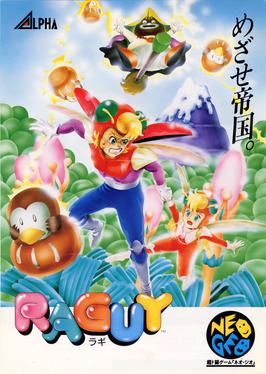
Blue's Journey is a side-scrolling platform game released by Alpha Denshi in 1990 on SNK's Neo Geo MVS arcade system and their AES home system. It was ported to the Neo Geo CD in 1994. It was rereleased on the Wii's Virtual Console in Europe on November 9, 2007, followed by North America on November 12, 2007.
Pendulo Studios S.L. is a Madrid-based video game developer founded in 1993 by Ramón Hernáez, Felipe Gómez Pinilla, Rafael Latiegui and Miguel Angel Ramos. Since the company's 1994 debut project, Igor: Objective Uikokahonia, it has specialized in graphic adventure games. Pendulo first achieved mainstream prominence in Spain via Hollywood Monsters (1997), which met with critical and commercial success in the country but was never released beyond Southern Europe.

Checkered Flag is a racing video game released for the Atari Lynx in 1991. A remake was released for the Atari Jaguar in 1994. Destination Software also planned to release a Game Boy Advance version of the title around 2005, but it was cancelled before it was released.

Micromanía was a Spanish computer game magazine. It was founded by the publisher HobbyPress, currently a subsidiary of Axel Springer SE. It was created in May 1985 and is one of the first magazines in Europe exclusively devoted to video games. It was first published soon after MicroHobby, which had been created just a few months earlier by the same publisher. The magazine in its two first periods was a major outlet supporting of the golden era of Spanish software. Micromanía celebrated its 25th anniversary in 2010. In July 2012, Axel Springer sold Micromanía to other owner, focussing its video game coverage in its other magazine, Hobby Consolas. The Micromanía team continued the printed magazine independently, published by BlueOcean Publishing, until its final issue in February 2024.

Rubén Doblas Gundersen (Spanish:[ruˈβenˈdoβlasˈɣundeɾsen];, better known as elrubiusOMG or simply El Rubius, is a Norwegian-Spanish YouTuber whose channel primarily consists of gameplays and vlogs. He has the most subscribers in Spain and is among the top 50 most subscribed-to channels of the platform in the world.

Soccer Brawl is a futuristic soccer game first released in arcades on February 14, 1992. It was available on the Neo Geo on March 13 the same year and later for the Neo Geo CD on March 31, 1995.
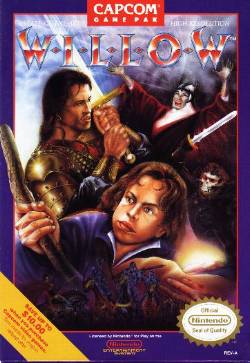
Willow is a 1989 2D action role-playing game developed and published by Capcom for the Nintendo Entertainment System. It is loosely based on the 1988 film of the same name and is the second title Capcom released based on Willow that year, the first being an unrelated side scrolling arcade game. The version of Willow released for the Nintendo Entertainment System and the Famicom is an adventure game in the vein of The Legend of Zelda.
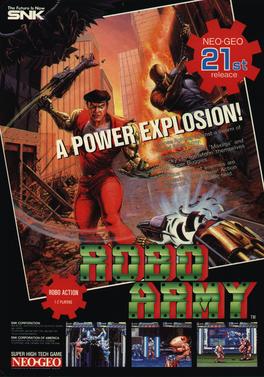
Robo Army is a beat 'em up video game developed and published by SNK that was released for Neo Geo arcades and home consoles in 1991 and the Neo Geo CD in 1995.
Fun & Serious Game Festival is a video game festival that takes place, in Bilbao, Spain, from late November to the beginning of December since its foundation in 2011. Its main objective is to recognize the cultural importance of video games. To do so, several leisure and training activities are celebrated, such as the VIT Talks and the Fun & Serious Awards.
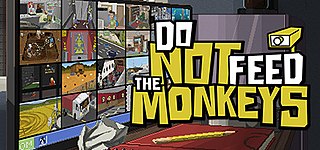
Do Not Feed the Monkeys is a 2018 adventure and life simulation video game developed by the Fictiorama Studios and published by Alawar Premium for Windows and PlayStation 4.
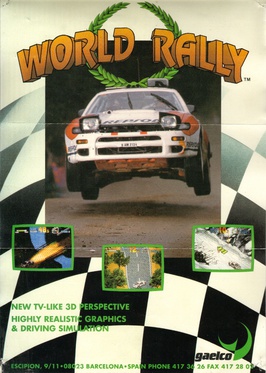
World Rally is a 1993 racing arcade video game developed by Zigurat Software and published by Gaelco in Spain, Sigma in Japan and Atari Games in North America. Themed around rallying, the game pit players with races across various locations under a short time limit to qualify for the next couse.

Super Sidekicks is a 1992 soccer arcade video game developed and published by SNK. It is the first installment in the eponymous series and the second soccer game released for Neo Geo MVS, succeeding Soccer Brawl (1991). Featuring an arcade-style approach to soccer compared to other games released at the time, the title allows players to choose any of the available game modes with AI-controlled opponents or other human players with the team of their choosing. Its gameplay uses a simplified two-button configuration.
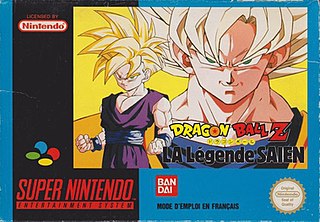
Dragon Ball Z: Super Butōden 2 is a 1993 fighting video game developed by Tose and published by Bandai for the Super Nintendo Entertainment System. Based upon Akira Toriyama's Dragon Ball franchise, it is the sequel to Dragon Ball Z: Super Butōden, which was released earlier in 1993 for SNES. Following the Cell Games arc and a side-story about characters from the films Dragon Ball Z: Broly – The Legendary Super Saiyan and Dragon Ball Z: Bojack Unbound, its gameplay remains relatively the same as the original Super Butōden, consisting of one-on-one fights using a main six-button configuration, featuring special moves as well as three playable modes.

Dragon Ball Z: Super Butōden 3 is a 1994 fighting video game developed by Tose and published by Bandai for the Super Nintendo Entertainment System. Based upon Akira Toriyama's Dragon Ball franchise, it is the sequel to Dragon Ball Z: Super Butōden 2, which was released earlier in 1993 for SNES. Following the Majin Buu arc, its gameplay remains relatively the same as the previous two Super Butōden entries, consisting of one-on-one fights using a main six-button configuration, featuring special moves as well as two playable modes.














